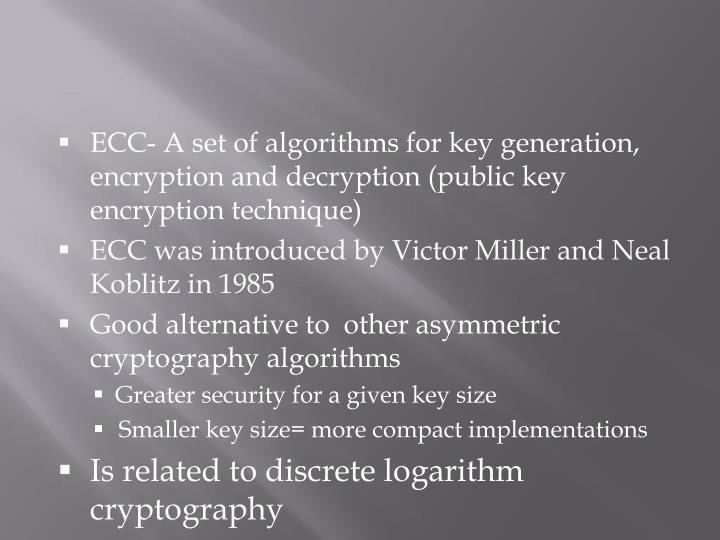Key Generation Algorithms In Cryptography
- Key Generation Algorithms In Cryptography And Data
- Key Generation Algorithms In Cryptography History
- Key Generation Algorithms In Cryptography Theory
- Cryptography Algorithms Pdf
Key agreement A (pair-wise) key-establishment procedure in which the resultant secret keying material is a function of information contributed by both participants, so that neither party can. Key generation is the process of generating keys for cryptography.The key is used to encrypt and decrypt data whatever the data is being encrypted or decrypted. Modern cryptographic systems include symmetric-key algorithms (such as DES and AES) and public-key algorithms (such as RSA). We will see two aspects of the RSA cryptosystem, firstly generation of key pair and secondly encryption-decryption algorithms. Generation of RSA Key Pair. Each person or a party who desires to participate in communication using encryption needs to generate a pair of keys, namely public key and private key. Java provides KeyGenerator class this class is used to generate secret keys and objects of this class are reusable. To generate keys using the KeyGenerator class follow the steps given below. Step 1: Create a KeyGenerator object. The KeyGenerator class provides getInstance method which accepts a String variable representing the required key-generating algorithm and returns a KeyGenerator.
Danger
This is a “Hazardous Materials” module. You should ONLY use it if you’re100% absolutely sure that you know what you’re doing because this module isfull of land mines, dragons, and dinosaurs with laser guns.
DSA is a public-key algorithm for signing messages.
Generation¶
cryptography.hazmat.primitives.asymmetric.dsa.generate_private_key(key_size, backend)[source]¶Generate a DSA private key from the given key size. This function willgenerate a new set of parameters and key in one step.
| Parameters: |
|
|---|---|
| Returns: | An instance of |
| Raises: | cryptography.exceptions.UnsupportedAlgorithm – This is raised ifthe provided |
cryptography.hazmat.primitives.asymmetric.dsa.generate_parameters(key_size, backend)[source]¶New in version 0.5.
Generate DSA parameters using the provided backend.
| Parameters: |
|
|---|---|
| Returns: | An instance of |
| Raises: | cryptography.exceptions.UnsupportedAlgorithm – This is raised ifthe provided |
Signing¶
Using a DSAPrivateKeyinstance.
The signature is a bytes object, whose contents is DER encoded asdescribed in RFC 3279. This can be decoded usingdecode_dss_signature().
If your data is too large to be passed in a single call, you can hash itseparately and pass that value usingPrehashed.
Verification¶
Verification is performed using aDSAPublicKey instance.You can get a public key object withload_pem_public_key(),load_der_public_key(),public_key(), orpublic_key().
verify() takes the signature in the same format as is returned bysign().
verify() will raise an InvalidSignatureexception if the signature isn’t valid.
If your data is too large to be passed in a single call, you can hash itseparately and pass that value usingPrehashed.
Numbers¶
cryptography.hazmat.primitives.asymmetric.dsa.DSAParameterNumbers(p, q, g)[source]¶The collection of integers that make up a set of DSA parameters. /router-key-generator-apk-free-download.html.
p¶| Type: | int |
|---|
The public modulus.
q¶| Type: | int |
|---|
The sub-group order.
g¶| Type: | int |
|---|
The generator.
parameters(backend)[source]¶| Parameters: | backend – An instance ofDSABackend. |
|---|---|
| Returns: | A new instance ofDSAParameters. |
cryptography.hazmat.primitives.asymmetric.dsa.DSAPublicNumbers(y, parameter_numbers)[source]¶New in version 0.5.
The collection of integers that make up a DSA public key.
y¶| Type: | int |
|---|
The public value y.
parameter_numbers¶| Type: | DSAParameterNumbers |
|---|
The DSAParameterNumbersassociated with the public key.
public_key(backend)[source]¶| Parameters: | backend – An instance ofDSABackend. |
|---|---|
| Returns: | A new instance ofDSAPublicKey. |
cryptography.hazmat.primitives.asymmetric.dsa.DSAPrivateNumbers(x, public_numbers)[source]¶The collection of integers that make up a DSA private key.
Warning
Revealing the value of x will compromise the security of anycryptographic operations performed.
x¶| Type: | int |
|---|
The private value x.
public_numbers¶| Type: | DSAPublicNumbers |
|---|
The DSAPublicNumbersassociated with the private key.
private_key(backend)[source]¶| Parameters: | backend – An instance ofDSABackend. |
|---|---|
| Returns: | A new instance ofDSAPrivateKey. |
Key interfaces¶
cryptography.hazmat.primitives.asymmetric.dsa.DSAParameters[source]¶DSA parameters.

generate_private_key()[source]¶New in version 0.5.
Generate a DSA private key. This method can be used to generate manynew private keys from a single set of parameters.
| Returns: | An instance ofDSAPrivateKey. |
|---|
cryptography.hazmat.primitives.asymmetric.dsa.DSAParametersWithNumbers[source]¶Extends DSAParameters.
parameter_numbers()[source]¶Create aDSAParameterNumbersobject.
| Returns: | ADSAParameterNumbersinstance. |
|---|
cryptography.hazmat.primitives.asymmetric.dsa.DSAPrivateKey[source]¶New in version 0.3.
A DSA private key. A DSA private key that is not anopaque key also implements DSAPrivateKeyWithSerializationto provide serialization methods.
public_key()[source]¶| Returns: | DSAPublicKey |
|---|
An DSA public key object corresponding to the values of the private key.
parameters()[source]¶| Returns: | DSAParameters |
|---|
The DSAParameters object associated with this private key.
key_size¶| Type: | int |
|---|
The bit length of q.
sign(data, algorithm)[source]¶Changed in version 1.6: Prehashedcan now be used as an algorithm.
Sign one block of data which can be verified later by others using thepublic key.
| Parameters: |
|
|---|---|
| Return bytes: | Signature. |
cryptography.hazmat.primitives.asymmetric.dsa.DSAPrivateKeyWithSerialization[source]¶This interface contains additional methods relating to serialization.Any object with this interface also has all the methods fromDSAPrivateKey.
private_numbers()[source]¶Create aDSAPrivateNumbersobject.
| Returns: | ADSAPrivateNumbersinstance. |
|---|
private_bytes(encoding, format, encryption_algorithm)[source]¶Allows serialization of the key to bytes. Encoding (PEM orDER),format (TraditionalOpenSSLorPKCS8)and encryption algorithm (such asBestAvailableEncryptionor NoEncryption)are chosen to define the exact serialization.
| Parameters: |
|
|---|---|
| Return bytes: | Serialized key. |
cryptography.hazmat.primitives.asymmetric.dsa.DSAPublicKey[source]¶New in version 0.3.
A DSA public key.
Key Generation Algorithms In Cryptography And Data
key_size¶| Type: | int |
|---|
The bit length of q.
parameters()[source]¶| Returns: | DSAParameters |
|---|
The DSAParameters object associated with this public key.
public_numbers()[source]¶Create aDSAPublicNumbersobject.
| Returns: | ADSAPublicNumbersinstance. |
|---|
public_bytes(encoding, format)[source]¶Allows serialization of the key to bytes. Encoding (PEM orDER) andformat (SubjectPublicKeyInfo)are chosen to define the exact serialization.
Key Generation Algorithms In Cryptography History
| Parameters: |
|
|---|---|
| Return bytes: | Serialized key. |
verify(signature, data, algorithm)[source]¶Changed in version 1.6: Prehashedcan now be used as an algorithm.
Verify one block of data was signed by the private keyassociated with this public key.
Key Generation Algorithms In Cryptography Theory
| Parameters: |
|
|---|---|
| Raises: | cryptography.exceptions.InvalidSignature – If the signature doesnot validate. |
cryptography.hazmat.primitives.asymmetric.dsa.DSAPublicKeyWithSerialization¶Cryptography Algorithms Pdf
Alias for DSAPublicKey.